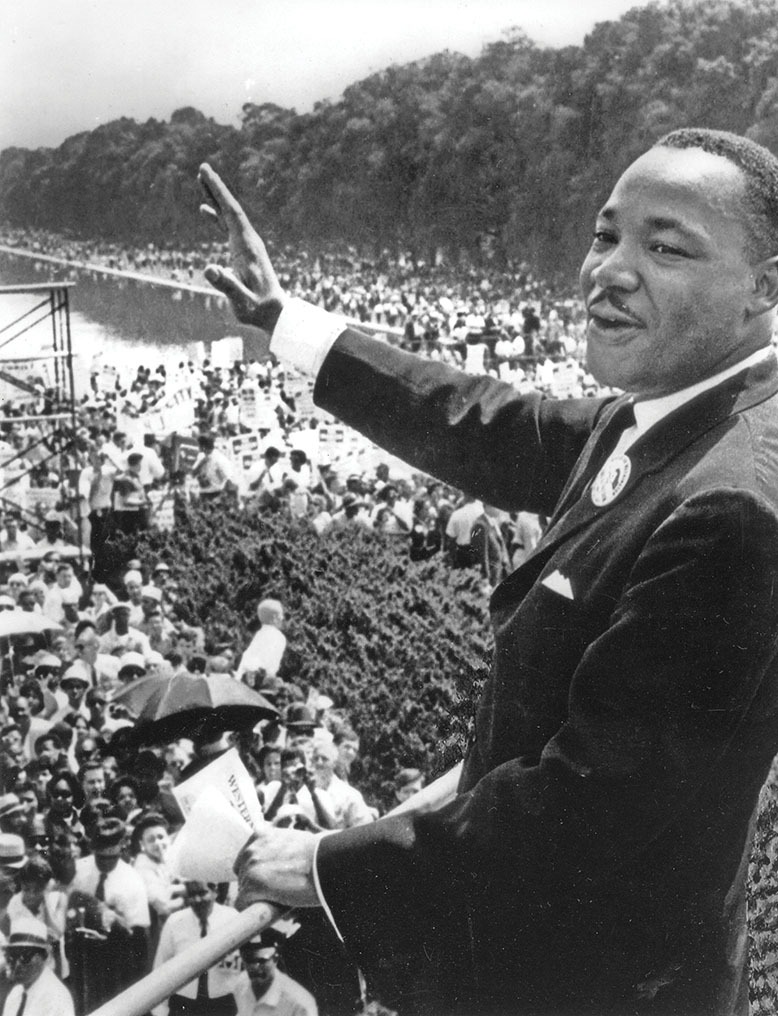[ad_1]

Dr. Martin Luther King Jr. is seen at the March on Washington in August of 1963. Photo: Alamy Stock Photo/Pictorial Press LTD
February is Black History Month, and there is no better time to think about one of the most essential African American leaders in the history of our nation, Dr. Martin Luther King Jr., who was assassinated in 1968 at just 39 years old.
Many people remember King for his electrifying “I Have a Dream” speech, which played an important role in helping pass the 1964 Civil Rights Act. Less known are his significant New Jersey years. King lived in Camden from 1948 to 1951 while serving as a seminarian in Philadelphia. It was in that house where, historians say, his initial fight for civil rights began, after he and some friends were denied service at a tavern in Maple Shade.
To a student of leadership, King is a case study in servant leadership, as he focused on the well-being of others with dignity and respect for all, and he used public communication to move people to act. Recently, I interviewed Jonathan Eig, author of the much-acclaimed book King: A Life, who told me, “One of the miraculous things about King is that he had an ability to speak across lines: Black and white, North and South, left and right. His appeal was based on the fact that he was calling out to our principles as Americans and our belief in God, and he was able to unite that. …People found something in his message that resonated, even if they weren’t necessarily on board with the Civil Rights movement. And I think that gives us hope that there may still be things that unite us.”
I also spoke with Reverend Forrest M. Pritchett, director of the Dr. Martin Luther King Jr. Leadership Program at Seton Hall University. (Full disclosure: Seton Hall University is an underwriter of the public-policy programming I anchor on public broadcasting.) Pritchett says that, beyond the “I Have a Dream” speech, King’s most important contribution was “to appeal to the moral consciousness of America.”
Pritchett is a longtime civil rights activist and mentor of minority students. During his more than 40-year tenure at Seton Hall, he has coordinated the annual Dr. Martin Luther King Jr. Day Symposium, which provides perspectives on racism, privilege and justice while educating students and schoolteachers on King’s principles as a civil rights leader. The university’s Martin Luther King Jr. Leadership Program started in 1970 and provided full scholarships to African American students; today, says Pritchett, “we offer scholarships to students from around the world who have a vested interest, whether they’re from Africa, Venezuela, or from Newark, and who can articulate strategies and plans for very specific action and social justice projects.”
It is important that we recognize King, a courageous and impactful leader who gave his life for the cause of civil rights. Says Pritchett of honoring him, “It is important because the issue of race and the issue of systemic racism is not going away. It’s almost cyclical.”
Pritchett is absolutely right. The struggle for civil rights and the fight against institutional racism goes on, yet King’s contributions continue to be felt.
I often wonder, if King were alive today, how he would impact our often contentious race relations, and help us more honestly and empathetically talk about both our differences and similarities—regardless of race. He is missed now more than ever.
Steve Adubato, PhD, is the author of six books, including his newest, Lessons in Leadership 2.0: The Tough Stuff. He is an Emmy Award–winning anchor with programs airing on Thirteen/WNET (PBS) and NJ PBS. He has also appeared on CNN, CBS News and NBC’s Today show. Steve Adubato’s Lessons in Leadership video podcast, with cohost Mary Gamba, airs Sundays at 10 am on News 12+. For more information, visit stand-deliver.com.
No one knows New Jersey like we do. Sign up for one of our free newsletters here. Want a print magazine mailed to you? Purchase an issue from our online store.
[ad_2]
Source_link


